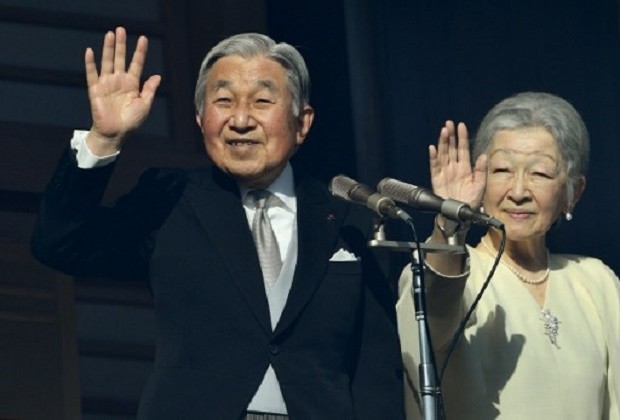
Japanese Emperor Akihito (L) and Empress Michiko (R) wave to well-wishers on the balcony of the Imperial Palace in Tokyo on January 2, 2017.
About 47,000 well-wishers gathered at the Imperial Palace where Emperor Akihito called for peace in his New Year’s speech. AFP
TOKYO, Japan – Japan’s Emperor Akihito delivered his traditional New Year address Monday with tens of thousands of people flocking to the Imperial Palace for what could be his last such appearance after he expressed his desire to abdicate.
It was his first New Year message since he announced in August that his advancing age and weakening health mean he may no longer be able to carry out his duties, setting the stage for Japan to prepare for an historic abdication.
The Imperial Palace said some 58,600 people attended his address in fine weather, many waving small Japanese flags and shouting “Banzai” or “Long live”.
“At the start of this year, I wish for happiness and tranquility of people in the world and our country,” the emperor said in a televised address from a glass-covered balcony at the palace, where he was flanked by other members of the royal family.
READ: Japan Emperor has a cold, cancels year-end banquet
Deliberations over his retirement wish are under way in an advisory panel set up by Prime Minister Shinzo Abe in September to study a possible legal mechanism for a royal departure, which currently does not exist.
Any eventual move by Akihito to step down, which would see him replaced by his eldest son Crown Prince Naruhito, appears to have wide support, according to recent opinion polls.
Akihito has had surgery for prostate cancer and heart problems, both of which he alluded to in his August announcement, though he stressed that he currently enjoys good health.
Speculation about Akihito’s future emerged last year with reports he had told confidantes that he would like to step down in a few years, in what would be the first abdication from the Chrysanthemum Throne in two centuries.
Akihito has keenly embraced the role of symbol of the state imposed after World War II ended. Previous emperors including his father, Hirohito, had been treated as semi-divine.
Akihito is credited with seeking reconciliation both at home and abroad over the legacy of the war fought in his father’s name, venturing to a number of locales that saw intense fighting, including Okinawa in Japan and Saipan, Palau and the Philippines overseas, offering prayers for the souls of all the dead.